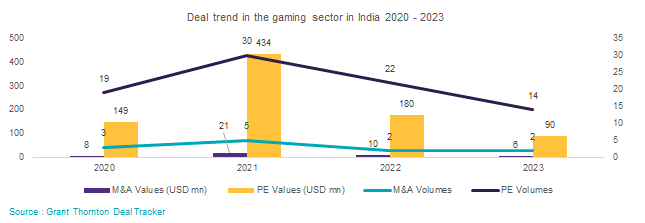-
Business Consulting
Our business consulting specialists offer a comprehensive blend of strategic advisory services. We assess the business, industry, operating model, synergy, skill sets and vision of the organisation and recommend the way forward
-
Digital Natives
Unlock growth with Grant Thornton Bharat's Digital Natives solutions. Customised support for tech-driven companies in healthcare, gaming, and more.
-
Digital Transformation Services
Grant Thornton’s digital transformation services help traditional businesses digitalise their business models with cloud technology, IoT consulting, app development and more DigiTech solutions.
-
Finance Transformation
Using a holistic approach, integrating digitalisation and digital transformation we help clients achieve transparency, control, governance, and faster decision making through real-time data within the business.
-
Human Capital Consulting
Our Human Capital Consulting team harnesses technology and industry expertise to assist in constructing adaptable organisations with transparency, fostering productive and value-driven workforces, and inspiring employees to engage meaningfully in their tasks.
-
Production Linked Incentive Scheme
Production-linked Incentive Scheme by the Indian government is aimed at boosting manufacturing. Grant Thornton Bharat offers varied services across sectors to help businesses avail of this scheme.
-
Public Sector Advisory
Our Public Sector Advisory team has focused streams, aligned with the core priorities of the Government of India. We are responsible for providing innovative and customized technical and managerial solutions.
-
Tech Advisory
We have amalgamated Digital Transformation, IT Advisory & Information Management and Analytics into a new offering, DigiTech.

-
Direct Tax services
Our tax specialists offer a comprehensive blend of tax services, tax litigation, regulatory and compliance services, helping you navigate through complex business matters.
-
Indirect Tax Services
Get tax services by leading tax firm Grant Thornton India. Our indirect tax services include consulting, compliance and litigation services for corporate, international and transaction tax
-
Transfer pricing services
Our transfer pricing services experts provide a range of services from provision of APA services to handling large global assignments including Country by Country reporting.
-
US Tax
At Grant Thornton, we help individuals and dynamic companies deal with US tax laws, which are one of the most complicated tax legislations across the world.
-
Financial Services - Tax
Best financial advisory services, tailored for small and large businesses by the experts having comprehensive knowledge of domestic laws and access to multifaceted tools to provide a valuable results.
-
Financial Reporting consulting services
Our experts have significant hands-on experience in providing IFRS/US GAAP services, end-to-end solutions and support services to fulfil financial reporting requirements.
-
Fund accounting and financial reporting
International operations often lack standardisation and have varied local reporting formats and requirements. Our experts can offer proactive insights, practical guidance, and positive progress and help meet regulatory timeframes.
-
Compliance and Secretarial Services
Our experts can assist in overhauling the entire compliance machinery of the organisation through evaluation of the applicable statutory obligations, monitoring of adequate governance controls, reporting and providing ongoing support.
-
Global People Solutions
As businesses transcend borders, both domestic and global considerations need equal attention. Our interim CFO and financial controller support services help organisations meet the business vision.
-
Finance and accounting outsourcing
Our accounting experts assist organisations in managing their accounting and reporting. Our dedicated Integrated Knowledge and Capability Centre (IKCC), allows us to service both the domestic and global markets efficiently and cost-effectively
-
Compliance Management System
We have automation solutions for you that will allow meeting government requirements and remain diligent, which when failed, can lead to penalties and loss in revenue.
-
Global compliance and reporting solutions
At Grant Thornton Bharat, we meet the challenges of our clients and help them unlock their potential for growth. Our professionals offer solutions tailored to meet our clients’ global accounting and statutory reporting requirements. With first-hand experience of local reporting requirements in more than 145+ locations worldwide, we provide seamless and consistent international service delivery through a single point of contact.
-
Related-party transaction governance
Related-party transactions (RPTs) are common in business structures where organisations engage with their group entities, such as holding companies, subsidiaries, associate concerns, joint ventures, or key management personnel, for various operational or financial purposes.
-
Family Offices & Private Client Services
Grant Thornton Bharat Private Client Services offers tailored advisory for family-owned businesses, focusing on governance, compliance, tax, succession planning, and family office structuring to sustain wealth and preserve legacies across generations.
-
GTMitra: Tax & Regulatory Tool
GTMitra, a specialised tax and regulatory tool by Grant Thornton Bharat, supports multinational businesses in understanding laws and regulations for effective growth strategies.
-
Labour codes
Labour codes solutions help you transition through the new legislation. At Grant Thornton, we help businesses divide their approach to make sure a smooth transition.
-
Alerts
At Grant Thornton India, with the help of our tax alerts, we help to provide updates on how to minimise your tax exposure and risks.
-
Unlocking opportunities: India investment roadmap
The India Investment Roadmap resource is designed to navigate the complexities of Indian tax and regulatory laws, providing seamless guidance and a comprehensive set of solutions to ensure a smooth process for investors aiming to establish or expand their presence in India.
-
CFO Solutions
Our comprehensive suite of solutions for CFOs

-
Cyber
In today’s time, businesses have gone through large transformation initiatives such as adoption of digital technologies, transition to cloud, use of advanced technologies et al.
-
Risk Optimisation
Our Governance, Risk and Operations (GRO) services encompass Internal Audit, Enterprise Risk Management, Internal Financial Controls, IT advisory, Standard Operating Procedures and other services.
-
Risk analytics
Grant Thornton Bharat’s CLEARR Insights is a state-of-the art data analytics platform that will help you in seamless data analysis and efficient decision-making.
-
Forensic & Investigation Services
The team of forensic advisory services experts consists of the best intelligence corporate experts, and fraud risk, computer forensic experts to deliver most effective solutions to dynamic Indian businesses.
-
Digital Forensics and Incident Response (DFIR)
Strengthen cyber resilience with proactive forensic audits
-
ESG consulting
Grant Thornton Bharat offers holistic ESG consulting solutions for sustainable business outcomes. With industry expertise and AI technology, we drive long-term value.

-
Transaction Tax Services
Our transaction tax experts understand your business, anticipate your needs and come up with robust tax solutions that help you achieve business objectives ensuring compliance and efficiency
-
Deal Advisory
Unlike other M&A advisory firm in India, we offer deal advisory services and work exclusively with controlled and well-designed strategies to help businesses grow, expand and create value.
-
Due Diligence
Grant Thornton’s financial due diligence services are aimed at corporate looking for mergers and acquisitions, private equity firms evaluating investments and businesses/promoters considering sale/divestment.
-
Valuations
As one of the leading valuation consultants in India, Grant Thornton specializes in all the aspects of the process like business valuation services, financial reporting, tax issues, etc.
-
Overseas Listing
Overseas listing presents a perfect platform for mid-sized Indian companies with global ambitions. Grant Thornton’s team of experts in listings, work closely with clients during all stages.
-
Debt & Special Situations Solutions
Grant Thornton Bharat offers specialist debt and special situations consulting services, including restructuring, insolvency, and asset tracing solutions.
-
Financial Reporting Advisory Services
Grant Thornton Bharat Financial Reporting Advisory Services offer end-to-end solutions for complex financial requirements, including GAAP conversions, IPO support, and hedge accounting advisory, ensuring accurate financial reporting and compliance.
-
Financial Statement Audit and Attestation Services
Grant Thornton Bharat offers customised financial statement audit and attestation services, ensuring impeccable quality and compliance with global standards. Our partner-led approach, technical expertise, and market credibility ensure effective solutions for your business needs.

- Agriculture
- Asset management
- Automotive and EV
- Aviation
- Banking
- Education and ed-tech
- Energy & Renewables
- Engineering & industrial products
- Fintech
- FMCG & consumer goods
- Food processing
- Gaming
- Healthcare
- Urban infrastructure
- Insurance
- Media
- Medical devices
- Metals & Mining
- NBFC
- Pharma, bio tech & life sciences
- Real estate and REITs
- Retail & E-commerce
- Specialty chemicals
- Sports
- Technology
- Telecom
- Transportation & logistics
- Tourism & hospitality
-
 Thought leadership Co-lending in India: Expanding credit access for MSMEsIn today’s rapidly evolving financial landscape, co-lending has emerged as a key enabler of credit expansion in India, facilitating partnerships between banks and non-banking financial companies (NBFCs) to extend credit more efficiently to underserved segments.
Thought leadership Co-lending in India: Expanding credit access for MSMEsIn today’s rapidly evolving financial landscape, co-lending has emerged as a key enabler of credit expansion in India, facilitating partnerships between banks and non-banking financial companies (NBFCs) to extend credit more efficiently to underserved segments. -
 Article Why India’s financial inclusion journey needs to focus on equity and access to creditFinancial services have expanded over a decade, giving millions access to bank accounts and digital payments. But true empowerment needs to reach every corner of the country if growth is to be long-term and sustained
Article Why India’s financial inclusion journey needs to focus on equity and access to creditFinancial services have expanded over a decade, giving millions access to bank accounts and digital payments. But true empowerment needs to reach every corner of the country if growth is to be long-term and sustained -
 Thought Leadership Competitive and sustainable agriculture & food processing in KeralaThe economy of Kerala is primarily driven by the services sector, which contributes 66% to the Gross State Domestic Product (GSDP).
Thought Leadership Competitive and sustainable agriculture & food processing in KeralaThe economy of Kerala is primarily driven by the services sector, which contributes 66% to the Gross State Domestic Product (GSDP). -
 Article Economic Survey 2024-25: Deregulation, investment and innovation for a Viksit BharatIndia's economic growth remains for a steady trajectory with real GDP expected to grow at 6.4% in FY25 and in the range of 6.3%-6.8% in FY26, reflecting resilience despite global uncertainties.
Article Economic Survey 2024-25: Deregulation, investment and innovation for a Viksit BharatIndia's economic growth remains for a steady trajectory with real GDP expected to grow at 6.4% in FY25 and in the range of 6.3%-6.8% in FY26, reflecting resilience despite global uncertainties.
-
India-UK
India-UK

The gaming landscape in India has undergone a remarkable transformation, evolving from a leisure activity to a lucrative career option. The emergence of the animation, visual effects, gaming, and comics (AVGC) sector has had a positive influence on the gaming industry, propelling it towards rapid growth. Despite being in its nascent stage, the sector has the potential to revolutionise gaming in India, driven by ongoing technological advancement and growing acceptance.

Post-pandemic, the gaming industry has become a hub for investment activities. Notably, there has been a surge in private equity (PE) funding and a marginal uptick in mergers and acquisition (M&A) activities, highlighting investors' recognition of the sector's growth potential and innovative prowess. Moreover, the official inclusion of e-sports in multi-sport events managed by the Ministry of Youth Affairs and Sports in December 2022 has given a significant boost to the industry. In 2023 alone, 14 gaming start-ups secured approximately USD 90 million in funding, with a focus on e-sports and mobile gaming. Furthermore, emerging technologies such as virtual reality (VR) and augmented reality (AR) are reshaping the gaming landscape, offering new avenues for developers and gamers. However, they also bring cybersecurity challenges as games become more connected and interactive.
Despite the industry's growth, it faces stiff competition and cybersecurity concerns have become paramount due to increased connectivity, making games susceptible to attacks.
List of gaming companies that raised multiple rounds of funding during 2020-YTD 2023:
| Companies | No of funding rounds | Amount (USD million) |
|---|---|---|
| Gamerji e-Sports Private Limited | 5 | 11 |
| Cashgrail Private Limited- Zupee | 4 | 120 |
| Super Six Sports Gaming Private Limited- Fantasy Akhada | 4 | 17 |
| Bombay Play Pvt Ltd | 3 | 10 |
| Mobile Premier League(MPL) | 3 | 335 |
| Greenhorn Wellness Pvt. Ltd- EloElo | 3 | 37 |
| TICTOK Skill Games Private Limited- WinZo | 3 | 85 |
Source : Grant Thornton Deal Tracker
Recent tax amendments in the gaming sector, including levy of GST @ 28% on total amount deposited with suppliers (including advances), introduction of specific provisions for online gaming and mandatory registration for offshore gaming platforms have spurred proactive discussions within the industry. Furthermore, issuance of GST notices for a previous period, par treatment of game of skill and chance, non-adjustment of GST on refund/return amount and classification of online money gaming as goods have left room for various interpretations.
Globally, several countries including Australiai, the Czech Republic,ii among others, have adopted gross gaming revenue (GGR)-based taxation models. Some other countries such as Portugaliii, Polandiv etc., which impose tax on contest entry amounts, have subsidised tax rates ranging from 3% to 15% with a rising tendency towards taxing GGR rather than the full face value of bets placed. With the low profit margins, such non-standardisation of tax implications at the global level could potentially lead to a significant shift of consumers towards offshore platforms or even illicit gaming and betting platforms.
These amendments may have overarching effects on employment generation in this fast-growing industry, especially in the start-up space. Adapting to these changes will require careful deliberation and meticulous planning to alleviate the impact of the additional tax burden on online gaming players. One crucial consideration for gaming platforms will be whether to absorb the entire GST liability or pass on a portion or the additional burden to gaming players. With the lower GGR and higher tax rates, absorbing the full tax impact might prove financially untenable for gaming platforms. Conversely, passing on the entire burden to players could significantly reduce the prize pool and disincentivise users from participating. While foreign direct investment (FDI) plays a pivotal role in the gaming sector's growth in India, the revised tax regime could impact gaming companies' profitability and India's appeal as an investment destination. Therefore, striking a balance between the tax burden, global competitiveness and net winnings for players becomes paramount with a focus on scaling up the userbase to mitigate the impact of the increased tax burden and ensuring the sector's sustainable growth and success in future.
Sources
- https://www.ato.gov.au/business/gst/in-detail/your-industry/gst-when-conducting-gambling-activities/
- https://www.iprh.cz/en/documentation/act-no-187-2016-on-gambling-tax-unofficial-translation/
- http://gst.customs.gov.my/en/rg/SiteAssets/gst_actw/GOODS_AND_SERVICES_TAX_ACT_2014v1.pdf
- https://ibia.bet/wp-content/uploads/2021/08/IBIA-An-Optimum-Betting-Market.pdf
- https://ibia.bet/wp-content/uploads/2021/08/IBIA-An-Optimum-Betting-Market.pdf
